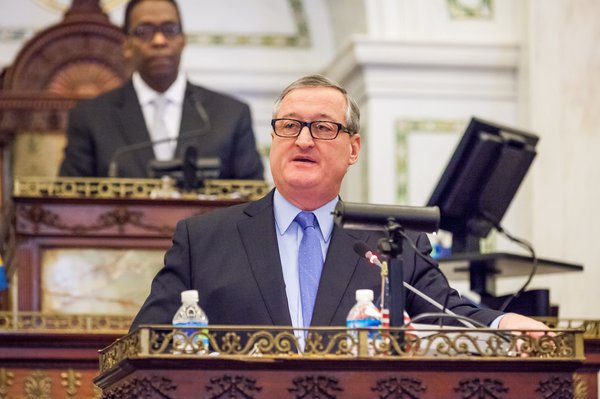Two Philadelphia city councilmembers on Thursday said they oppose the soda tax that would provide much of the revenue in Mayor Jim Kenney's 2017 spending plan for initiatives that would create universal pre-K and provide help to neighborhoods.
Kenney's budget calls for a drastic three-cent per ounce tax on sugary drinks – the highest such tax in the country, if approved – that could be a tough sell to Council, which must lend its approval to the plan. He presented his much anticipated 2017 budget plan and a five-year financial plan on Thursday morning at City Hall.
- RELATED CONTENT
- Drexel researcher makes case for Kenney's soda tax
- A soda tax to fund pre-K and city parks? Seems fair to me
After hearing Kenney's presentation, Councilman Brian O'Neill (R-10th District) said the mayor gave an "excellent address," but added that he could never support the sugary drinks tax. O'Neill said he worked to defeat a soda tax proposed by former Mayor Michael Nutter.
"The soda tax was two cents," he said. "And, we defeated that then and, now, it's increased by 50 percent."
Republican Councilman-at-large Al Taubenberger agreed, saying he supported Kenney's desire to lower the city's wage tax – from 3.92 percent to 3.73 percent for residents and from 3.49 percent to 3.33 percent for non-residents – over the next five years. But he said he didn't like the idea of counting on a single new tax on sugary drinks to pay for many of the proposals.
"It's bad to focus on just one industry," he said.
WHAT'S IN THE BUDGET?
On Thursday, the freshman mayor opened his remarks talking about his history as a city councilman and said that his time on council has helped him shape a budget proposal that would "protect the rights of our most vulnerable."
The $4.17 billion budget – up more than $100 million from last year's budget of $3.9 billion – also includes funds to improve parks and recreation centers throughout Philadelphia.
But it all comes with a price tag.
• $80 million over six years for new vehicles for the Fire and Streets Departments.
• $256 million for a pre-K program that Kenney said he hopes will serve 25,000 children.
• $350 million in investment for improvements to the city's infrastructure, including repairing and modernizing city police and fire department buildings, libraries, parks and rec centers.
• $100 million in bonds to make municipal buildings more energy efficient.
• $26 million to invest in the city's growing pension fund.
• $550,000 per year, over the next six years, to buy body cameras for the city's police force.
• $4 million initially to create 25 community schools in the city.
COULD A SUGARY DRINKS TAX WORK?
To help pay for it, Kenney said his proposal for a tax on sugary drinks would generate about $95 million in additional tax revenues for the city.
"The problem is that big soda charges our citizens, small businesses and distributors much, much more than what it costs them to make the soda," Kenney said. "And then, they use some of these profits to fund lobbyists, who come here and say that a tax on sugary drinks will cost jobs and devastate small business."
The tax plan got a rousing round of applause from the crowd in attendance during Thursday's proposal.
Kenney's budget proposal also drew support from School District of Philadelphia Superintendent William Hite, who praised Kenney's support for Pre-K and community schools.
"These significant investments will unite the city in support of our students," Hite said in a statement released Thursday afternoon.
Kenney acknowledged that he voted against Nutter's soda tax proposal four years ago as councilman after hearing claims that the tax would hurt low-income families and minority communities.
He also said that he believed the tax wouldn't cost local jobs, as a similar tax on liquor hadn't cost jobs locally.
"Employment did not slow down after the liquor tax was instituted. In fact, Philadelphia's restaurant and bar scene has grown," said Kenney.
'THERE WILL BE JOB LOSS'
Council has 90 days to review the mayor's budget proposal, and Taubenberger said he's looking forward to digging into the plan and seeing what works, and what doesn't.
"We are going to take a look at it," he said. "We need to look at what we can afford."
Several representatives from the restaurant industry and labor unions argued that as soda tax would hurt the economy rather than help the city, as the mayor suggests.
"This is a huge increase," said John Longstreet, president and CEO of the Pennsylvania Restaurant and Lodging Association, noting the tax would likely cut into restaurant profit margins. "We don't want to do anything that's going to hurt restaurants."
Frank Keel, spokesperson for the city's teamsters union, agreed that the new tax could adversely impact local residents, especially for those who count on sugary beverages for jobs.
In fact, Keel argued that Kenney's plan was a "pie in the sky" ideal, and said the mayor's comments alluded to "if you're against this, you're against small children."
"We know for a fact that there will be job loss," Keel said.
After the proposal, city council president Darrell Clarke (D-5th District), who has been working closely with Kenney on the community schools project, was asked if opposition to the sugary drinks tax could stall some of the goals of the budget proposal.
"We will go through the [review] process and there will be pros and cons," he said. "We still have 90 days to discuss this."

